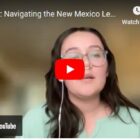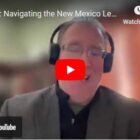Journalism
Politicos who remove journalists from public events disrespect democracy
|
Over the weekend our former colleague, Sandra Fish, was kicked out of the Colorado statewide GOP assembly for doing her job. Sandra works for the Colorado nonprofit news organization, the Colorado Sun, which has gotten crosswise with the chairman of Colorado’s Republican party for fair but hard-hitting journalism. Her ejection has generated national headlines.
But before Sandra worked for the Colorado Sun, she worked for New Mexico In Depth from 2014 through 2017, using her formidable data analyzing skills to report on hard-to-get-at issues such as New Mexico’s less-than-ideal process for funding brick and mortar projects around the state, the flow of money in politics and the role of lobbyists in lawmaking.
Sandra Fish
To our knowledge, she is the only reporter to have spent months rifling through contracts to determine how much lobbyists working for public institutions in New Mexico collected from their employers over a period of time: $7.2 million in 2014-15. Because of lax New Mexico’s transparency laws, Sandra couldn’t do the same rifling to see how much private-sector corporations spent on lobbyists, a lack of disclosure that obscures how much is really spent on lobbying in New Mexico.
Nearly a decade later, that secrecy is still intact.New Mexicans also can thank Sandra, in part, for the Legislature’s decision a few years ago to finally disclose how much each state lawmaker spends on brick-and-mortar projects. She broke the news in 2015 that state law prohibited disclosure of that information unless a state lawmaker consented to allowing the public to see how they individually spent public dollars.
During her three years with us, Sandra’s reporting sometimes ruffled elected and public officials, some of whom complained.








